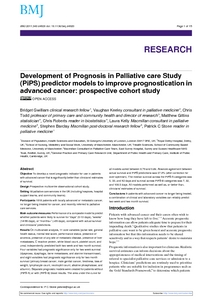Gwilliam, B; Keeley, V; Todd, C; Gittins, M; Roberts, C; Kelly, L; Barclay, S; Stone, PC
(2011)
Development of Prognosis in Palliative care Study (PiPS) predictor models to improve prognostication in advanced cancer: prospective cohort study.
BRITISH MEDICAL JOURNAL, 343 (d4920).
ISSN 1756-1833
https://doi.org/10.1136/bmj.d4920
SGUL Authors: Stone, Patrick
![[img]](https://openaccess.sgul.ac.uk/101238/1.hassmallThumbnailVersion/bmj.d4920.pdf)  Preview |
|
["document_typename_application/pdf; charset=binary" not defined]
Published Version
Download (471kB)
| Preview
|
Abstract
OBJECTIVE: To develop a novel prognostic indicator for use in patients with advanced cancer that is significantly better than clinicians' estimates of survival.
DESIGN: Prospective multicentre observational cohort study. SETTING: 18 palliative care services in the UK (including hospices, hospital support teams, and community teams). PARTICIPANTS: 1018 patients with locally advanced or metastatic cancer, no longer being treated for cancer, and recently referred to palliative care services.
MAIN OUTCOME MEASURES: Performance of a composite model to predict whether patients were likely to survive for "days" (0-13 days), "weeks" (14-55 days), or "months+" (>55 days), compared with actual survival and clinicians' predictions.
RESULTS: On multivariate analysis, 11 core variables (pulse rate, general health status, mental test score, performance status, presence of anorexia, presence of any site of metastatic disease, presence of liver metastases, C reactive protein, white blood count, platelet count, and urea) independently predicted both two week and two month survival. Four variables had prognostic significance only for two week survival (dyspnoea, dysphagia, bone metastases, and alanine transaminase), and eight variables had prognostic significance only for two month survival (primary breast cancer, male genital cancer, tiredness, loss of weight, lymphocyte count, neutrophil count, alkaline phosphatase, and albumin). Separate prognostic models were created for patients without (PiPS-A) or with (PiPS-B) blood results. The area under the curve for all models varied between 0.79 and 0.86. Absolute agreement between actual survival and PiPS predictions was 57.3% (after correction for over-optimism). The median survival across the PiPS-A categories was 5, 33, and 92 days and survival across PiPS-B categories was 7, 32, and 100.5 days. All models performed as well as, or better than, clinicians' estimates of survival.
CONCLUSIONS: In patients with advanced cancer no longer being treated, a combination of clinical and laboratory variables can reliably predict two week and two month survival.
| Item Type: |
Article
|
| Additional Information: |
Copyright © Gwilliam et al 2011
This is an open-access article distributed under the terms of the Creative Commons Attribution Non-commercial License, which permits use, distribution, and reproduction in any medium, provided the original work is properly cited, the use is non commercial and is otherwise in compliance with the license. See: http://creativecommons.org/licenses/by-nc/2.0/ and http://creativecommons.org/licenses/by-nc/2.0/legalcode. |
| Keywords: |
Attitude to Death, England, Female, Health Status, Humans, Male, Mental Competency, Mental Status Schedule, Models, Biological, Neoplasms, Nurses, Palliative Care, Physicians, Prognosis, Prospective Studies, Statistics as Topic, Survival Analysis, Truth Disclosure, Science & Technology, Life Sciences & Biomedicine, Medicine, General & Internal, General & Internal Medicine, TERMINALLY-ILL PATIENTS, SURVIVAL PREDICTION, INFORMATION NEEDS, SCORE, VALIDATION, SCALE, PREFERENCES, PHYSICIANS, FAMILIES, WOMEN |
| Journal or Publication Title: |
BRITISH MEDICAL JOURNAL |
| ISSN: |
1756-1833 |
| Dates: |
| Date | Event |
|---|
| 25 August 2011 | Published |
|
| Web of Science ID: |
WOS:000294410400002 |
  |
Download EPMC Full text (PDF)
|
 |
Download EPMC Full text (HTML)
|
| URI: |
https://openaccess.sgul.ac.uk/id/eprint/101238 |
| Publisher's version: |
https://doi.org/10.1136/bmj.d4920 |
Statistics
Item downloaded times since 28 May 2014.
Actions (login required)
 |
Edit Item |



